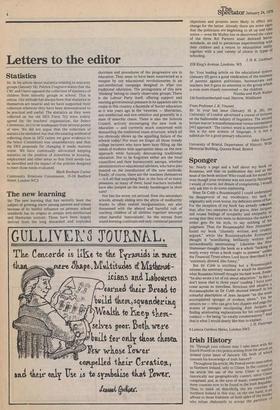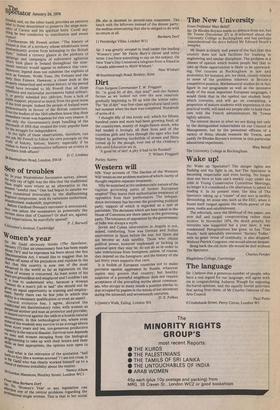Irish History
Sir: Through your column may I take issue with Mt Enoch Irelando ch Powell (your issue two opointsf ja January ua or arising ys i n g lofrom both his at h o concern his knowledge of Irish history? Throughout Throughout his article, Mr Powell never once refer; to Northern Ireland, only to Ulster. In the context o his historicallytohoer guesoegroafphthioeoltlyermoorrUelcstterssince Ulster comprised, and, in the eyes of many, comprises still, three counties now to be found in the Irish Republic. Thus, to insist on describirig the six counties of Northern Ireland in this way, on the one hand, is an affront to those Irishmen on both sides of the border who refuse obdurately to accept the partition of 1relai1d; and on the other hand, provides an emotive label to those determined to preserve the siege-mentalky of Carson and his spiritual heirs. Could any thing be less conducive to conciliation and sweet
reason?
Furthermore Mr Powell writes: "The history of Ireland is that of a territory whose inhabitants were 1,3,redominantly averse from belonging to the British State.' Indeed a cursory glance at the plethora of uPrisings and campaigns of subversive agitation Which took place in Ireland throughout the nineteenth century would appear to enhance this view. Moreover, legend does not minimise the exploits of shell as Emmett, Wolfe Tone, the Fenians and the early Sinn Feiners. However, a closer look at the Pr°PerlY researched and written history of the period would have revealed to Mr Powell that all these re, hellions and nationalist movements failed militari,Y, or gently subsided into oblivion, from a lack of Public suPPort, physical or moral, from the great mass Of the Irish people. Indeed the people of Ireland were predominantly in favour of the British connection. Even the leaders of the 1916 rebellion knew that their Irruriediate cause was hopeless for this very reason. It was only the Government's inept handling of the rermath of 1916 that created the truly popular base
r the struggle for independence.
In the light of these observations, therefore, can htne ask Mr Powell to follow his own precepts on the s !'idy of history, history, history: especially if he !k_ishes to have a constructive influence on events in Northern Irish affairs?
D. C. Lindsay Bassingham Road, London, SW18



































 Previous page
Previous page